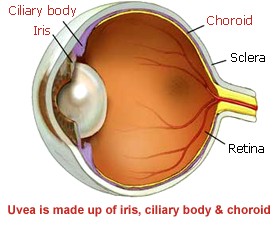Uveitis
Uveitis
What is uvea?
If we think of the eye as a hollow, fluid-filled, 3-layered ball, then the outer layer is the sclera, a tough coat, the innermost is the retina, the thin light-gathering layer, and the middle layer is the Uvea. It is like mother, nourishes the eye with blood vessels. The Uvea is made up of the iris, the ciliary body and the choroid.

What is uveitis?
 Uveitis is an inflammation of the uvea. Uveitis requires prompt treatment by an eye doctor. Without treatment, uveitis can damage vision. Although the potential for confusion sounds high, as long as it is remembered that uveitis is actually a number of different conditions, it is, of course, very important, for both patients and doctors, to establish the exact type of uveitis that exists, as far as it is possible.
Uveitis is an inflammation of the uvea. Uveitis requires prompt treatment by an eye doctor. Without treatment, uveitis can damage vision. Although the potential for confusion sounds high, as long as it is remembered that uveitis is actually a number of different conditions, it is, of course, very important, for both patients and doctors, to establish the exact type of uveitis that exists, as far as it is possible.
How is your eye affected in uveitis?
Uveitis most often inflames the iris (iritis). Since the iris opens and closes the pupil (the hole through which you see) any inflammation can cause pain and sensitivity to light. Often the eye gets red, vision may become blurred and the patient, may see spots floating in the eye. Untreated, it can worsen leading to more severe eye diseases, like glaucoma, cataract and patient may even lose vision.
What causes uveitis?
There are a number of causes of uveitis. It may result from an infection such as bacteria (TB, Leprosy, Syphilis) virus (e.g. Herpes) or a parasite (Toxoplasmosis).
It may be related to an autoimmune disease (with or without involvement of other parts of the body). This, essentially, is when our immune system recognises a part of our own body as foreign . Trauma to the eye, or even the other eye in the past, can lead to uveitis. In many cases, the cause is said to be unknown. This may well mean that the uveitis is of the autoimmune type. The word “idiopathic” may often be used to describe this group.
What are symptoms of Uveitis?
- Light Sensitivity
- Blurring of Vision
- Pain
- Floaters
- Redness
How to Diagnose Uveitis?
When symptoms occur, a careful history and examination of the eye and the whole body is extremely important, and needs to be aided by tailored investigations to arrive at a diagnosis. Since uveitis can be associated with disease in other parts of the body, your ophthalmologist will want to know about your overall health. Inflammation will affect sight, can lead to blindness, if left untreated.
Tests and examinations
A careful examination of whole body is required as many systemic conditions are associated with inflammation of eye. Examination by an ophthalmologist is extremely important when symptoms occur.
How is uveitis treated?
He or she may also treat the systemic condition that’s causing uveitis. As it is associated with many systemic diseases, physicians of other specialties must be aware of this vision disabling condition and refer to ophthalmologist for treating and screening as well which is equally important.
The treatment of Uveitis aims to achieve the following:- Relief of pain and discomfort (where present)
- To prevent sight loss due to the disease or its complications
- To treat the cause of the disease where possible
Like the varied nature of uveitis, the treatment of it may differ from case to case quite considerably. At times patient may be referred to other specialities for confirmation of systemic diseases.
Specific treatment given for entities like TB or Leprosy uveitis. Corticosteroids are often the mainstay of treatment to control inflammation. But now we have some other newer drugs like immunosuppressive, drugs usually used along with the steroids for immunological causes
What will happen to my eyes (prognosis)?
This, once again, varies considerably, but there is a growing confidence, especially with the newer drug treatments, that the eyesight can be stabilised over the long term. Uveitis as a disease should be regarded as incurable in the sense that it may never completely go away, but that is not to say that it cannot be controlled.
Why follow-up is more important in uveitis?
Regular follow-up is must in uveitis, as it can be a vision threatening entity. The treatment includes stronger drugs and so careful follow up is mandatory to avoid iatrogenic complications.
Source: Aravind Eye Care
Last Modified : 2/20/2020
